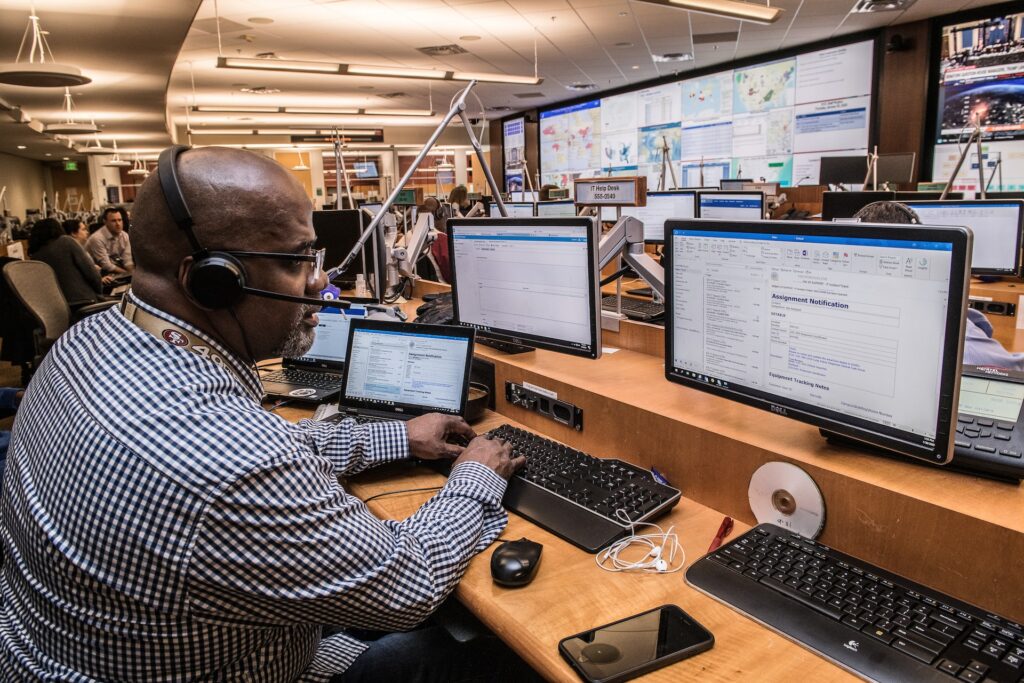Have you ever tried to document your company’s key operational processes? Did you find the experience to be daunting or a waste of time? If you answered “yes” to both of these questions, then you might need to outsource this work to an experienced professional.
That brings on the next challenge…who exactly do you hire?
Unfortunately, there is a plethora of conflicting descriptions on the world wide web regarding business process professionals. Though the true types and definitions of business process professionals are outside the scope of this article, I want to share some tips or factors to ensure you find the right process professional to complete your project.
The inspiration for developing these top ten factors came as a result of years of working on projects where companies bring me in to fix fix boo-boos after realizing that the person originally commissioned (sometimes an employee or outsourced professional) to perform the work was really not qualified to do the work in the first place. Keep in mind that these factors depend on your company’s industry and the complexity of your project. For simplicity, the role of Process Analyst is used to describe the type of business process professional for your project.
Top 10 Factors to Consider when Outsourcing Process Analysis Work
1. Educational Background
 All Process Analysts are not created equal. Process Analysis happens to be a role similar to Recruiters and Insurance Agents – people don’t go to college to get a degree specifically for these roles. However, there are certain skills that are acquired with certain degrees that ensure some degree of success in these roles.
All Process Analysts are not created equal. Process Analysis happens to be a role similar to Recruiters and Insurance Agents – people don’t go to college to get a degree specifically for these roles. However, there are certain skills that are acquired with certain degrees that ensure some degree of success in these roles.
In my opinion, Industrial Engineering happens to be the field most naturally suited for Process Analysis work. Industrial Engineers study everything from ergonomics to customer wait lines, but from a mathematical perspective. Chemical Engineers are also known as Process Engineers and study the flow of fluids whereas Electrical Engineers study the flow of electricity. Mechanical and Civil Engineers are the builders and are equipped to improve processes that involve the use of mechanical devices.
Engineers who also have an Master of Business Administration (MBA) have the ability to take their core engineering discipline and study the flow of information for the sake of improving a business’ bottom line. Other educational qualifiers include the Lean and Six Sigma certifications. These certifications might be especially important to you if you are more interested in hiring someone with experience in your industry as opposed to someone who has process-oriented degree.
2. Technical & Analytical Skills
 Technical and analytical acumen are required for successful process analysis. Process Analysis is more than just drawing a flowchart showing how various tasks are connected. Technical skills are needed to collect raw data on each task of a process and analytical skills are needed to interpret that data to identify improvement opportunities and visually demonstrate the difference in a flow diagram. While recruiting or searching for a Process Analyst, ask candidates questions about their level of expertise in working with MS Excel and MS Visio and request that they show samples (see factor #4) of spreadsheets and flow diagrams that they designed. If they have trouble explaining the structure of their designs, run!
Technical and analytical acumen are required for successful process analysis. Process Analysis is more than just drawing a flowchart showing how various tasks are connected. Technical skills are needed to collect raw data on each task of a process and analytical skills are needed to interpret that data to identify improvement opportunities and visually demonstrate the difference in a flow diagram. While recruiting or searching for a Process Analyst, ask candidates questions about their level of expertise in working with MS Excel and MS Visio and request that they show samples (see factor #4) of spreadsheets and flow diagrams that they designed. If they have trouble explaining the structure of their designs, run!
3. Troubleshooting Skills
 You might be thinking to yourself, “how on Earth do I gauge someone’s ability to troubleshoot?” One major way is by again looking at the candidate’s educational background and experience. People with experience in designing, programming and producing/manufacturing a tangible good tend to be excellent troubleshooters. You see, these folks know that they cannot sell a good that is off-spec and therefore must troubleshoot what went wrong in the designing, programming or manufacturing process to cause the good to be off-spec. Another way is to ask the candidate to provide specific details of when s/he helped a company (under ambiguous working conditions) to determine sources bottlenecks and constraints using process mapping and other analytical tools.
You might be thinking to yourself, “how on Earth do I gauge someone’s ability to troubleshoot?” One major way is by again looking at the candidate’s educational background and experience. People with experience in designing, programming and producing/manufacturing a tangible good tend to be excellent troubleshooters. You see, these folks know that they cannot sell a good that is off-spec and therefore must troubleshoot what went wrong in the designing, programming or manufacturing process to cause the good to be off-spec. Another way is to ask the candidate to provide specific details of when s/he helped a company (under ambiguous working conditions) to determine sources bottlenecks and constraints using process mapping and other analytical tools.
4. References & Work Samples
 Always ask for and seek references and recommendations of the potential Process Analyst candidates. Check online sources like LinkedIn to determine if the candidate has a profile that includes recommendations. Learn more about the people who provided recommendations and ask the candidate if you can contact these people for a reference check. The great thing about using LinkedIn as a reference tool is that you can immediately validate and confirm a reference’s identity. When meeting in-person, ask the candidates to bring samples of their work so that you can visualize the quality, thoroughness and organization of their work. Encourage them to tell you how they developed the work samples – short from giving an actual demonstration, this gives you insight as to whether or not this person is actually capable of doing the work. Be prepared to provide and/or sign a mutual non-disclosure agreement (NDA) that protects the confidential information that will be shared during the course of this meeting with the Process Analyst candidate.
Always ask for and seek references and recommendations of the potential Process Analyst candidates. Check online sources like LinkedIn to determine if the candidate has a profile that includes recommendations. Learn more about the people who provided recommendations and ask the candidate if you can contact these people for a reference check. The great thing about using LinkedIn as a reference tool is that you can immediately validate and confirm a reference’s identity. When meeting in-person, ask the candidates to bring samples of their work so that you can visualize the quality, thoroughness and organization of their work. Encourage them to tell you how they developed the work samples – short from giving an actual demonstration, this gives you insight as to whether or not this person is actually capable of doing the work. Be prepared to provide and/or sign a mutual non-disclosure agreement (NDA) that protects the confidential information that will be shared during the course of this meeting with the Process Analyst candidate.
5. Ability to Scope Your Project
 This is a point when your observation skills need to go into overdrive. When meeting with a Process Analyst candidate in-person or talking to on the phone, pay attention to whether the candidate initially does more talking than listening. Listening is a VITAL element in carefully scoping the details of a process analysis project. It is important for you as the business owner to first describe the project, as you see it.
This is a point when your observation skills need to go into overdrive. When meeting with a Process Analyst candidate in-person or talking to on the phone, pay attention to whether the candidate initially does more talking than listening. Listening is a VITAL element in carefully scoping the details of a process analysis project. It is important for you as the business owner to first describe the project, as you see it.
Then, ask the candidate to describe or offer potential strategies for scoping or fine-tuning the scope of your project. Do you understand the candidate’s proposal? Does it sound logical? If you are having trouble understanding, this might be a sign that this person does not have a good grasp of your project, relishes in process jargon (yes, some people will intentionally do this) or is altogether disqualified. It could also mean that you may not have done an adequate job in explaining the project. If the latter is the case, then wait to see if the candidate will ask more investigative questions to sense the true scope of the project. Again, pay close attention to the types of questions the candidate is asking. Are they mostly concerned about the project or about other factors such as pay rate, working hours, benefits, etc.?
6. Personality
 Process work is almost like police work. It requires keen investigative skills but more importantly, the ability to extract the information you need from key witnesses (in your case, staff and vendors that your company has a relationship with). Job shadowing and interviewing is an integral part of process work and requires a Process Analyst to possess an amicable, respectful and trustworthy personality. This is important because it is only natural for staff to be initially apprehensive about divulging the details of their work with a Process Analyst. Use a combination of logic, intuition and personality tests (i.e., Myers Brigg, DiSC, Kolbe) to determine if you are about to hire a person that others will feel comfortable talking to. I personally believe that this factor carries as much weight as the Process Analyst’s educational background and skills.
Process work is almost like police work. It requires keen investigative skills but more importantly, the ability to extract the information you need from key witnesses (in your case, staff and vendors that your company has a relationship with). Job shadowing and interviewing is an integral part of process work and requires a Process Analyst to possess an amicable, respectful and trustworthy personality. This is important because it is only natural for staff to be initially apprehensive about divulging the details of their work with a Process Analyst. Use a combination of logic, intuition and personality tests (i.e., Myers Brigg, DiSC, Kolbe) to determine if you are about to hire a person that others will feel comfortable talking to. I personally believe that this factor carries as much weight as the Process Analyst’s educational background and skills.
7. Knowledge of Intellectual Property Laws
 There are many reasons for documenting, maintaining and improving processes. Business processes are your company’s intellectual property. A qualified, experienced Process Analyst will be sensitive towards the proprietary and confidential nature of protecting your “secret sauce.” As you review the candidate’s work samples (see factor #4), look for intellectual property clues such as “For Internal Use Only,” “Controlled Copy,” “Copyright, ” and “Confidential.” Seeing something as simple as these phrases on the candidate’s work samples gives assurance that they have at least a basic understanding and respect for protecting proprietary company information. If your project requires process documentation for a patent application or trade secret, then it is absolutely critical to hire someone who has experience in those areas and can prove it.
There are many reasons for documenting, maintaining and improving processes. Business processes are your company’s intellectual property. A qualified, experienced Process Analyst will be sensitive towards the proprietary and confidential nature of protecting your “secret sauce.” As you review the candidate’s work samples (see factor #4), look for intellectual property clues such as “For Internal Use Only,” “Controlled Copy,” “Copyright, ” and “Confidential.” Seeing something as simple as these phrases on the candidate’s work samples gives assurance that they have at least a basic understanding and respect for protecting proprietary company information. If your project requires process documentation for a patent application or trade secret, then it is absolutely critical to hire someone who has experience in those areas and can prove it.
8. 1099, W2 or W9
 This factor largely depends on your budget. You should first take the time to research the hourly pay rate of a Process Analyst in your geographic region. Based on the scope of your project, can you afford to outsource the work to a Process Analyst? Knowing whether to structure the project for a 1099, W2 or W9 will help answer your question. It is possible to hire a Process Analyst as a W2 employee giving a 90 day grace period on benefits payout to save payroll costs. However, you will need to have a workspace for that employee as well as provide a computer with all the software tools needed to perform the work. You will also need to provide the scope of the project and be able to pay for at least 40 hours a week of paid work. The primary benefit is that you can have a person focused on working on your project exclusively.
This factor largely depends on your budget. You should first take the time to research the hourly pay rate of a Process Analyst in your geographic region. Based on the scope of your project, can you afford to outsource the work to a Process Analyst? Knowing whether to structure the project for a 1099, W2 or W9 will help answer your question. It is possible to hire a Process Analyst as a W2 employee giving a 90 day grace period on benefits payout to save payroll costs. However, you will need to have a workspace for that employee as well as provide a computer with all the software tools needed to perform the work. You will also need to provide the scope of the project and be able to pay for at least 40 hours a week of paid work. The primary benefit is that you can have a person focused on working on your project exclusively.
Hiring a Process Analyst as a 1099 Independent Contractor or W9 Company might allow you to spread the costs of the project over a longer period of time as the Analyst is more than likely working on projects for other companies simultaneously. This structure also means that the Process Analyst would provide his/her own equipment and tools for completing the project but you are still expected to provide them access to the people and other resources needed in order for them to complete the project on time. A disadvantage in spreading the project over a longer period of time is that you run the risk of either losing interest or not completing the project at all as other projects can and will take precedence.
Caution: Your level of involvement in the project (and the paperwork required) largely depends on how you structure the deal. Visit the IRS and Department of Labor websites to educate yourself on the nuances of 1099, W2 and W9 to prevent legal infractions.
9. Ability to Work Remotely/Virtually
 Process work requires extreme concentration – especially in the documentation and mapping stages. For this reason, many Process Analysts often find themselves having to work in isolated areas of an office or from a home office where there may be fewer or no distractions. The requirement to have a Process Analyst work remotely or virtually can arise if you either work from home also or you simply do not have the space to physically house a Process Analyst for extended periods of time. It is important to ask the candidates if they have a secure home office with access to a scanner, printer and fast speed internet. Keep in mind that some people have trouble working in isolation and you should figure this out sooner rather than later.
Process work requires extreme concentration – especially in the documentation and mapping stages. For this reason, many Process Analysts often find themselves having to work in isolated areas of an office or from a home office where there may be fewer or no distractions. The requirement to have a Process Analyst work remotely or virtually can arise if you either work from home also or you simply do not have the space to physically house a Process Analyst for extended periods of time. It is important to ask the candidates if they have a secure home office with access to a scanner, printer and fast speed internet. Keep in mind that some people have trouble working in isolation and you should figure this out sooner rather than later.
10. Flexibility
 This factor ties directly to how you decide to structure the working relationship with the Process Analyst (see factor #8). Should you decide to hire a Process Analyst as a W2, keep in mind that the overwhelming majority of Process Analysts are used to working for larger companies with larger budgets. If they have never worked for a small business, they are more than likely to quit before project completion should they receive a more lucrative offer from a larger company. This can also be a concern for a 1099 Independent Contractor or W9 Company – verify that these candidates have experience in working with small businesses.
This factor ties directly to how you decide to structure the working relationship with the Process Analyst (see factor #8). Should you decide to hire a Process Analyst as a W2, keep in mind that the overwhelming majority of Process Analysts are used to working for larger companies with larger budgets. If they have never worked for a small business, they are more than likely to quit before project completion should they receive a more lucrative offer from a larger company. This can also be a concern for a 1099 Independent Contractor or W9 Company – verify that these candidates have experience in working with small businesses.
A qualified Process Analyst with small business experience is most favorable because s/he understands that small businesses experience economic volatility quicker than their larger, corporate counterparts. As such, small businesses that do not exhibit flexibility to keep up with economic changes, die. Therefore process analysis projects in small businesses are prone to being interwoven with other projects and oftentimes are placed on the back burner when the deliverables of other projects take precedence.
************************************************************************************************
Many entrepreneurs and corporate managers alike underestimate the nature of business process analysis work and the results adversely affect their projects. As a small business owner, you do not usually have the luxury to throw good money after bad decisions that could be prevented or greatly minimized by taking the time to arm yourself with quality information. Print this article and use it as a checklist to help you in choosing the best person to complete your process documentation, management and/or improvement project.
Was this article helpful to you? Do you have additional questions? Let me know in the comments.











